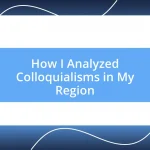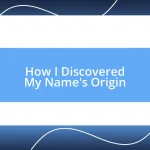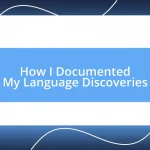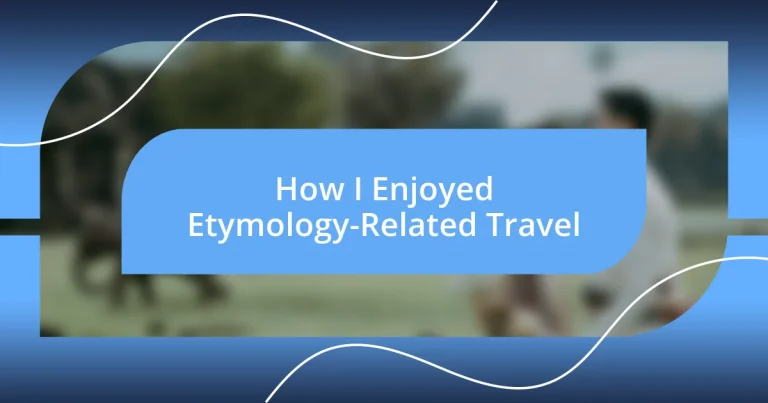Key takeaways:
- Etymology reveals historical connections and shared human experiences through words, enriching our understanding of language’s evolution.
- Traveling to linguistically significant locations, such as Athens and Edinburgh, allows for immersive encounters that enhance appreciation of local cultures and dialects.
- Engaging with language experts and locals fosters deeper insights and personal connections to words, transforming travel experiences into meaningful narratives.
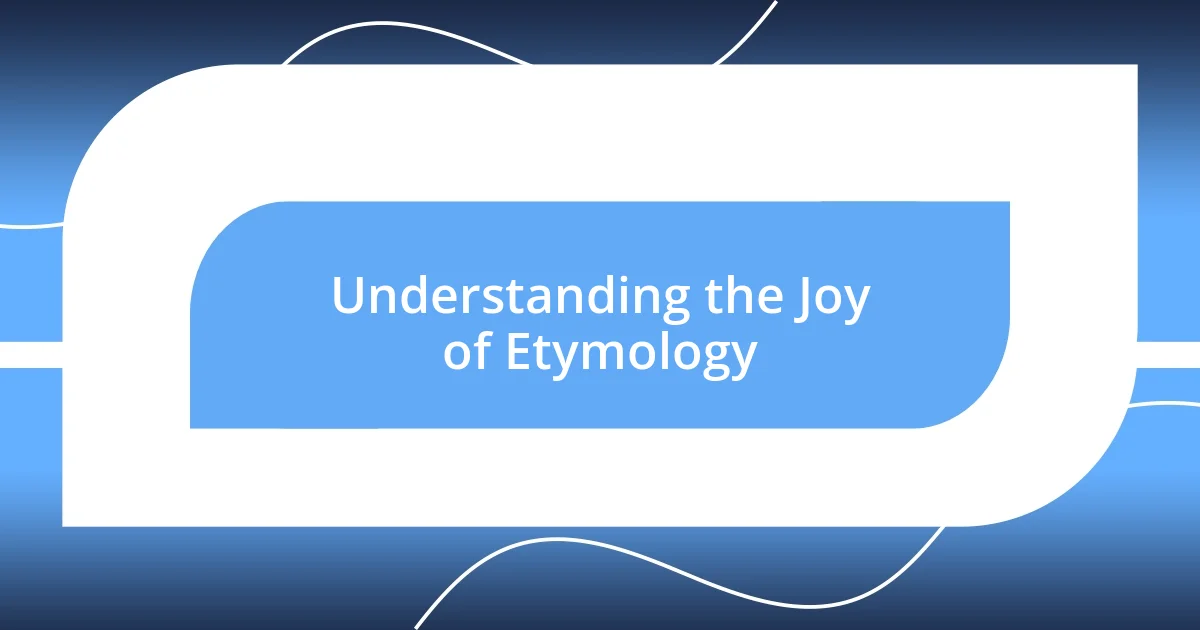
Understanding the Joy of Etymology
Diving into etymology feels like embarking on a treasure hunt, where each word is a clue leading me back in time. I remember standing in an old library, pulling dusty books off the shelves, and feeling the thrill of discovering that the word “quarantine” comes from the Italian “quaranta giorni,” meaning forty days. Isn’t it fascinating how a single word can carry centuries of history and culture within its syllables?
When I uncover the roots of words, I can’t help but feel an intimate connection with the generations that spoke them before me. For instance, learning that “salary” comes from the Latin “salarium,” which refers to the payments made to Roman soldiers to buy salt, made me reflect on how essential language is in weaving together our shared human experience. Have you ever thought about how words not only communicate ideas but also link us to the lives of those who came before?
Exploring etymology opens my eyes to the layers of meaning behind everyday language. I often find myself in conversations, eagerly sharing my newfound insights, like how “clue” originates from the word “clew,” meaning a ball of yarn that helps guide someone out of a maze. It’s such a joy to think that each word I speak carries a sense of history—a reminder that language evolves and adapts, just like we do.
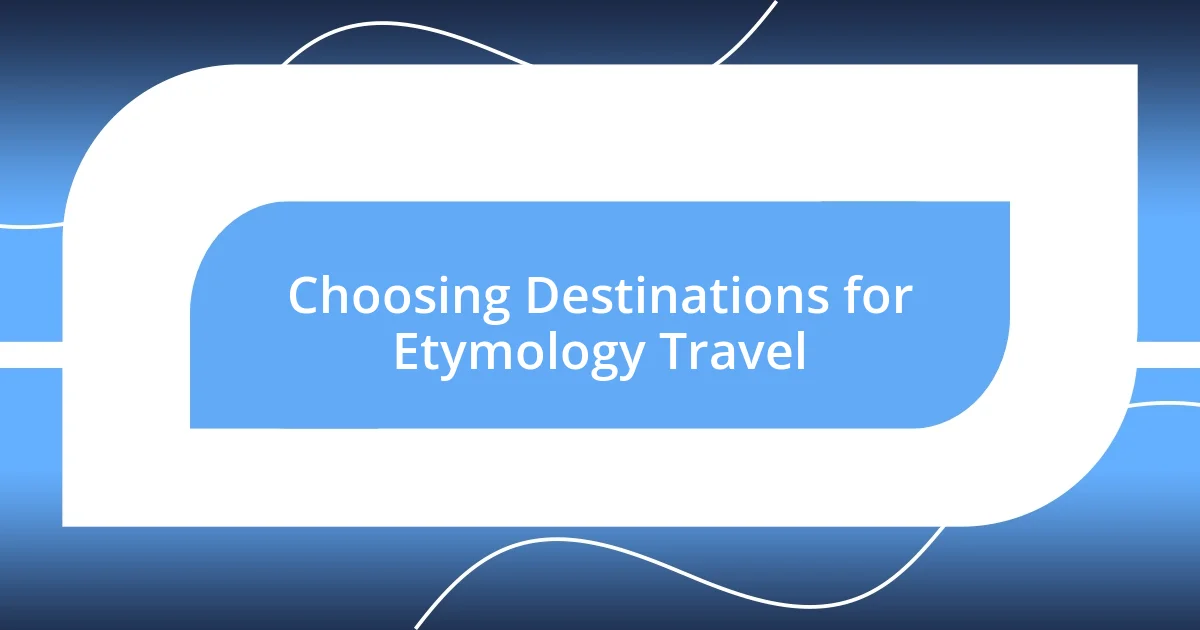
Choosing Destinations for Etymology Travel
Choosing destinations for etymology travel requires a blend of curiosity and a dash of imaginative exploration. Personally, I gravitate towards places steeped in history, where the evolution of language feels tangible. For me, visiting cities like Rome or Athens isn’t just sightseeing; it’s walking through a living dictionary. I remember wandering through the cobblestone streets of Paris and learning that “restaurant” derives from the French word meaning “to restore,” which added an extra layer to my appreciation of both the cuisine and the culture.
When selecting locations that will satisfy your etymological thirst, consider the following:
- Historical significance: Cities with rich linguistic heritage, such as Edinburgh, with its Scots language history or Constantinople, where languages converged.
- Multi-lingual environments: Regions where multiple languages co-exist, offering a living tapestry of etymological roots–think of Switzerland or Singapore.
- Cultural landmarks: Sites where language and culture intersect dramatically, such as the Acropolis or ancient trade routes.
By understanding the stories behind words in their native environments, the journey becomes infinitely more rewarding.
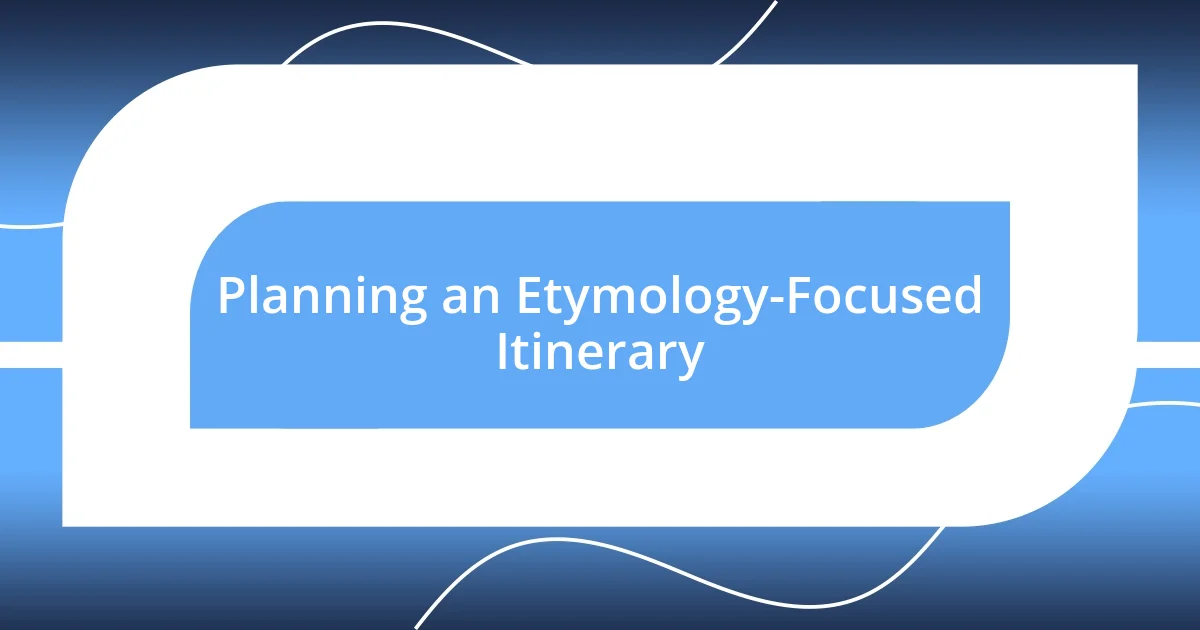
Planning an Etymology-Focused Itinerary
Planning an itinerary specifically for etymology-focused travel can truly enhance the experience. For example, when I planned my trip to the UK, I made a point to visit places like Oxford, where I could revel in the history of the English language. Standing in the very spots where J.R.R. Tolkien and C.S. Lewis once exchanged ideas gave me chills, as I realized I was walking in the footsteps of those who shaped modern literature.
I find that mapping out key linguistic sites can lead to the most enriching encounters. On one occasion, I decided to visit local bookstores in Edinburgh, intrigued by their collection of works in Scots. Discovering the term “dreich,” which describes the often gloomy, drizzly weather, made me appreciate the way words capture local sentiments and culture. Every destination tells a story, and when I find those stories intertwined with language, it makes my travels unforgettable.
Considering the diversity of languages within a single region can also improve your itinerary. For example, while traveling through Switzerland, I was fascinated by the blend of German, French, and Italian influences, each contributing to the region’s unique vernacular. The word “pizazz,” representing flair and excitement, drew my attention while chatting with locals; it’s derived from English slang. These serendipitous discoveries remind me how interconnected our languages and cultures truly are.
| Destination | Key Etymological Insight |
|---|---|
| Oxford, UK | Home to significant contributions to English literature and language. |
| Edinburgh, Scotland | Rich in Scots language, with local terms reflecting cultural aspects. |
| Switzerland | Aunique blend of languages influencing each other, enhancing local dialects. |
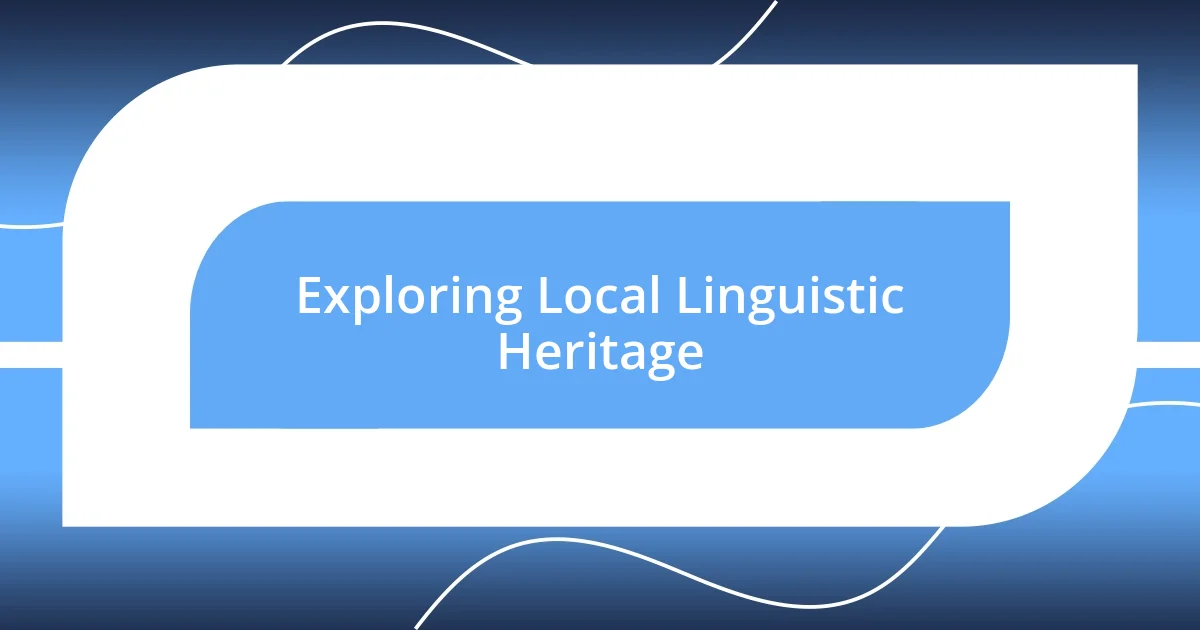
Exploring Local Linguistic Heritage
Exploring the linguistic heritage of a location can feel like peeling back layers of history. During my time in Barcelona, I stumbled upon a local café where they served “pa amb tomàquet,” a dish as rich in history as the Catalan language itself. The very name, a combination of “pa” (bread) and “tomàquet” (tomato), tells a story of the region’s traditional cuisine and its cultural identity. Isn’t it fascinating how a simple phrase can evoke such a vibrant picture of local life?
In addition to food, I often immerse myself in the regional dialects that showcase a place’s unique character. While in Lisbon, I encountered the word “saudade,” a term that encapsulates feelings of longing and nostalgia with no direct translation in English. This poignant concept resonated with me deeply, reminding me of the emotional ties we create with our travels and experiences. Have you ever come across a word that encapsulated your feelings more perfectly than any phrase in your native language?
When I wander through towns with rich etymological roots, I can’t help but feel a sense of connection to the people before me. While visiting the ancient ruins of Pompeii, I learned that the word “disaster” comes from the Italian disastro, rooted in astrology. It occurred to me that even in language, we see reflections of humanity’s shared experiences—our triumphs, our struggles, and, of course, our disasters. Each of these encounters fuels my passion for discovering how words shape our understanding of the world.

Engaging with Language Experts
Engaging with language experts opens up a treasure trove of knowledge that deepens any etymology-focused journey. I remember meeting a linguistics professor in a quaint café in Brussels, where our conversation flowed effortlessly. He shared insights about the evolution of French loanwords in English, and I was captivated by how history influences our daily language. Have you ever felt that rush when a simple discussion unveils layers of meaning?
At a language symposium in Dublin, I had the pleasure of attending a workshop led by a renowned etymologist. As he dissected terms like “gobbledygook,” a word that captures bureaucratic jargon, I could feel the room’s energy shift. It was thrilling to see fellow attendees nodding in agreement, all of us connecting over the quirks of our shared language. These moments solidify my belief that language thrives in community—not just in textbooks but in lively exchanges.
I find that the most fulfilling experiences often come from informal chats with locals, especially while exploring vibrant markets or bookstores. In a tiny shop in Lisbon, I struck up a conversation with the owner about the beautiful simplicity of the word “saber,” meaning “to know.” As he explained how it’s woven into the fabric of Portuguese culture, I felt a sense of belonging. Have you ever found a word that felt like a secret handshake between you and the locals? That’s the magic of engaging with language experts; it layers personal anecdotes onto the rich tapestry of language.
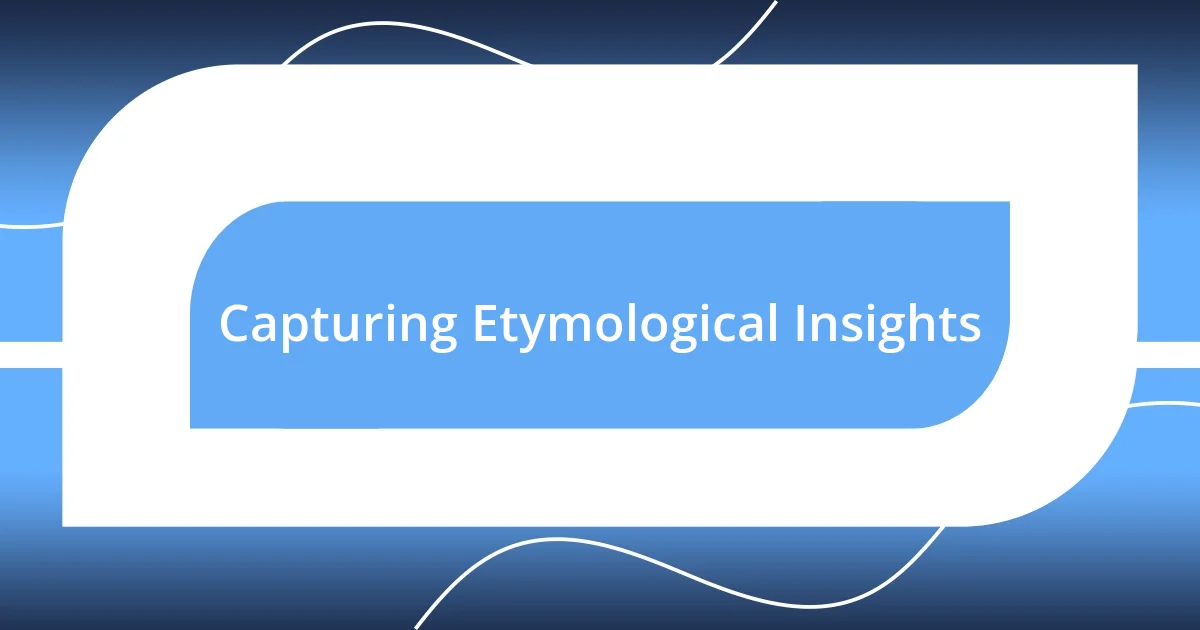
Capturing Etymological Insights
Capturing etymological insights often sparks unexpected connections. I recall an afternoon in Athens, where a local guide explained the origin of “democracy,” derived from the Greek demos (people) and kratos (power). As he shared how these concepts shaped not just words, but the very foundation of society, I felt the weight of history wrap around me like a warm blanket. Isn’t it awe-inspiring how a single term can encapsulate the voice of countless individuals through the ages?
Sometimes, it’s the little moments that resonate most deeply. While wandering through the winding streets of Edinburgh, I stumbled upon an ancient stone that bore the inscription “auld lang syne.” The phrase, which translates to “old long since,” brought a rush of nostalgia, reminding me of cherished friendships and shared memories. Don’t you find that certain words evoke just the right emotion at the right time?
Each location I visit offers a unique etymological puzzle, waiting for discovery. In a charming bookstore in Bologna, I came across a dusty tome detailing the shift from “pasta” in Italian to “paste” in English. It struck me how culinary terms often carry migrations of culture and identity within their syllables. Have you ever considered how the words we use can serve as bridges to our origins, revealing layers of culinary history in each bite? For me, capturing these insights transforms an ordinary trip into an extraordinary tapestry of language and understanding.

Reflecting on the Experience
Reflecting on the experience of exploring etymology while traveling has a way of connecting the dots between my personal history and the stories behind words. I vividly recall walking along the cobblestone streets of Florence and feeling an overwhelming sense of wonder as I encountered the Italian word “amore.” It was more than just a term for love; it felt like a melody that echoed through the city’s art and romance. Have you ever paused to appreciate how a word embodies the very essence of a place? That moment reminded me that language isn’t merely a tool; it’s a key that unlocks the shared human experience.
The memories I gathered during these travels often resurfaced unexpectedly, often accompanied by a wave of nostalgia. One particularly poignant moment occurred in a historic library in Oxford, where the air smelled of old books and knowledge. I discovered a tome on Old English, and flipping through its pages felt like unearthing a treasure chest of linguistic heritage. I distinctly remember pondering how words like “wǣpen,” meaning weapon, reveal intricate layers of life in those bygone eras. Have you ever held a book that seemed to pulse with history? It’s as if those very words held a conversation with me from the past.
Every journey has left its mark on my perspective, especially as I delve deeper into the roots of the languages I encounter. While sipping coffee in a tiny Vienna café, I learned that the term “kaffeehaus” is not merely about coffee, but also about the culture of conversation. It struck me that these havens foster sharing and connection, bridging gaps across different eras and experiences. Isn’t it fascinating how a single term can encapsulate an entire way of life? Reflecting on these insights, I realize that my travels are so much richer when infused with the essence of language, deeply connecting me to the world around me.

